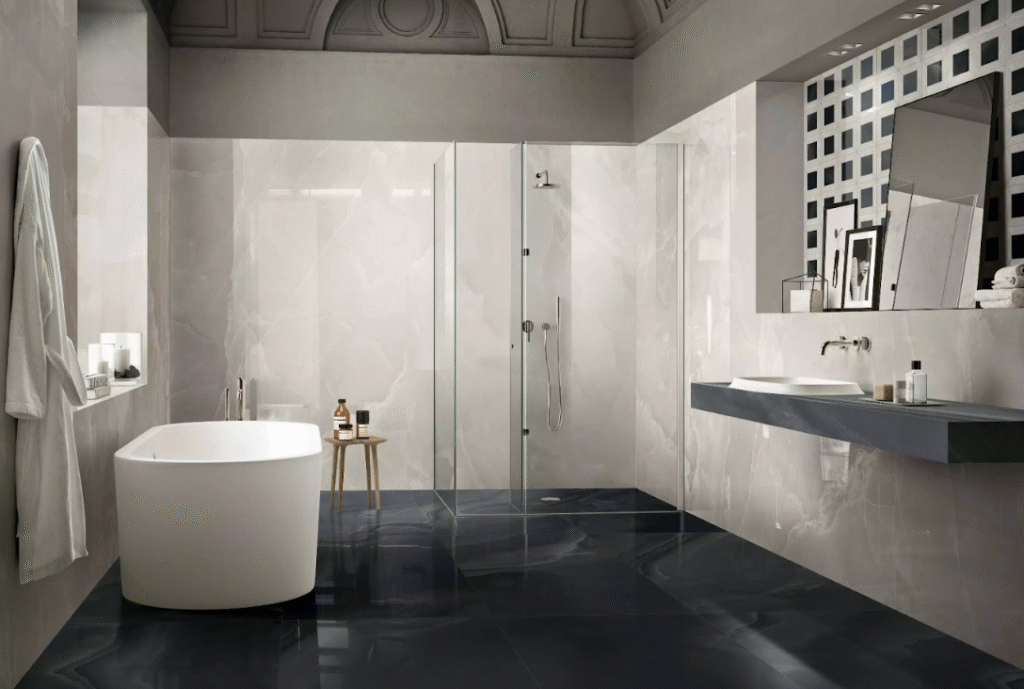
Bathrooms work harder than almost any other room in a building. They deal with water, steam, cleaning chemicals, and constant foot traffic. Over time, these conditions test every surface. Tiles can chip, grout can stain, and finishes can dull.
For homeowners, this affects daily comfort. For hotel owners, it impacts guest satisfaction and property reputation. In both cases, the choice of tile plays a major role in how the bathroom looks and performs over time.
Premium bathroom tiles cost more upfront. That’s what makes many people hesitate. But the higher price isn’t just for style—it’s for long-term performance, lower maintenance, and better safety.
They last longer
Lower-cost tiles often look fine when first installed. But their durability is limited. In a few years—sometimes less—they may start showing cracks, chips, or worn glaze. The issue is usually the density of the material and the quality of the finish.
Premium bathroom tiles are made with denser clay bodies or stronger stone, and they’re fired at higher temperatures. That extra density makes them far less likely to crack under impact or pressure. The glaze is thicker, harder, and more resistant to scratching.
In hotels, where hundreds of guests use the bathroom each year, these qualities are critical. A cracked tile isn’t just unattractive—it can become a hazard. Replacing a few damaged tiles in the middle of a busy season can disrupt operations. Higher-quality tiles reduce that risk.
They handle water better
Bathrooms are wet zones. Moisture doesn’t just sit on the surface—it tries to find its way into every gap and pore. Cheaper tiles often have higher porosity, meaning they absorb more water. This leads to stains, mold growth, and eventually, damage to the substrate beneath.
Premium bathroom tiles are manufactured to have very low water absorption rates. Porcelain tiles, for example, are nearly waterproof when installed correctly. This protects not just the tile, but the wall or floor beneath it.
For hotel bathrooms, quick turnaround between guests means tiles are often cleaned and still slightly damp when the next guest arrives. Low-absorption tiles dry faster and reduce the risk of lingering moisture that can lead to mildew smells or bacterial growth.
They’re safer underfoot
A wet bathroom floor can be dangerous. In a home, it could mean a trip to the ER. In a hotel, it could mean a liability claim. Slip resistance is often overlooked when choosing tiles, but it’s a real factor in safety.
Many premium bathroom tiles come with textured or matte finishes that improve grip when wet. The texture isn’t sharp or rough—it’s subtle enough to feel comfortable barefoot, but enough to reduce slipping.
This is especially important for spaces used by children, elderly residents, or high guest turnover. Safety isn’t an add-on—it’s built into the tile’s design.
They keep their appearance
Tiles are a big part of how a bathroom feels. If they look cheap or worn, the whole room feels tired. Low-cost tiles often have surface-printed patterns or thin glazes. Over time, the design can fade, scratch, or wear away. A single chip might expose a different color underneath.
Premium bathroom tiles typically use through-body color or high-quality glazes that stay vibrant for decades. Some are made from natural stone, where the pattern runs all the way through. Even if they chip, the damage is less noticeable.
For hotels, this means rooms maintain a fresh, well-kept appearance for much longer. For homeowners, it means the bathroom you love on installation day still looks good ten years later.
They’re easier to clean
Cleaning is constant in bathrooms. Cheaper tiles may have microscopic pits, uneven glazing, or rough edges that trap dirt and soap scum. Over time, these areas darken and require stronger cleaning chemicals or scrubbing, which can wear the tile even faster.
Premium tiles often have smoother, denser surfaces that resist dirt buildup. Some even feature factory-applied sealants or coatings that repel water and stains. This means less scrubbing, less use of harsh cleaners, and faster turnaround—something hotel cleaning teams value.
They improve property value
Bathrooms have an outsized impact on property value. Real estate agents often say kitchens and bathrooms sell homes. When buyers or guests see a bathroom finished with high-quality materials, it signals care, attention to detail, and durability.
For homeowners, this can make a property easier to sell and justify a higher price. For hotels, it can help maintain or raise nightly rates by meeting guest expectations for quality.
It’s not just about beauty—it’s about perceived and actual value. A bathroom that looks well-built and timeless is an asset.
Why the right supplier matters
Even the best tile can cause problems if it’s not sourced correctly. A reliable floor tiles supplier can make sure you get the right tile for the right purpose—considering factors like slip rating, water absorption, and wear resistance.
For large projects like hotels, a good supplier ensures you get consistent batches so every bathroom matches. This also helps if you need replacements later—tiles from the same lot will match in shade and texture.
For homeowners, the right supplier can guide you toward tiles that fit your budget without sacrificing essential qualities like durability and safety.
The real cost picture
On paper, premium bathroom tiles can cost twice or three times more than entry-level options. But if a low-quality tile needs replacing every few years, the total cost over time climbs quickly. Add in the labor for removal and installation, the disruption of the space, and the risk of water damage from failing tiles, and the cheaper option often becomes the more expensive one.
Hotels in particular benefit from this long-term view. A full bathroom renovation can take rooms out of service for weeks, costing revenue. If better tiles extend the life of that bathroom by even five years, the savings can be significant.
A long-term investment
Bathrooms aren’t just functional—they’re part of daily life and, in the case of hotels, part of a guest’s experience. Premium bathroom tiles protect that experience. They’re tougher, safer, and better looking for longer.
For homeowners, they reduce the hassle of constant upkeep and preserve the comfort of the space. For hotel owners, they protect the brand image and reduce maintenance costs.
The decision comes down to this: you can pay more once for quality, or you can pay less now and keep paying again and again. In a room as demanding as a bathroom, quality is almost always the better value.





